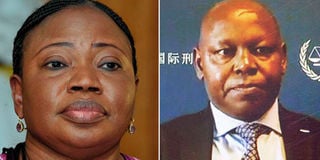ICC allows Bensouda to expand documents in case against Gicheru

Former ICC Chief Prosecutor Fatou Bensouda (left) who was allowed to tighten her case against Kenyan lawyer Paul Gicheru (right) who is facing charges of witness interference.
The International Criminal Court (ICC) has allowed Chief Prosecutor Fatou Bensouda to tighten her case against Kenyan lawyer Paul Gicheru by offering more explanation on why the six charges facing him should be confirmed and the matter proceed to trial.
Pre-Trial Chamber Judge Reine Adélaïde Sophie Alapini-Gansou has authorised the outgoing chief prosecutor to increase the size of the prosecution’s document containing the charges (DCC) from 120 pages to 175 pages so that the prosecution can set out its case in detail.
In its ruling, the Chamber noted that the defence (Gicheru) was not opposed to the prosecution’s request and that a combined document of 175 pages signifies only a very limited increase in the page numbers.
“The Chamber recalls that the proceedings are restricted to written submissions and that the parties will therefore not be accorded the possibility to make additional oral submissions,” said Judge Alapini-Gansou.
Exceptional circumstances
She also found that there exist exceptional circumstances to allow the prosecution’s request.
In her application, Ms Bensouda argued that there is an additional burden due to the fact that the proceedings are conducted entirely in writing, without any oral hearing.
This means, according to the ICC prosecutor, that the DCC must contain all statements and submissions concerning the case, which justifies the need for an extension of the page limit.
In the extended documents, she said the prosecution will give a detailed narrative and explanation of the evidence, including detailed footnotes referencing the supporting evidence.
Eight separate incidents
Ms Bensouda said the charges and narrative relate to eight separate incidents, each concerning a witness who was corruptly influenced, corrupted or interfered with by Mr Gicheru or his associates.
She argued that the narrative relating to each of the witnesses is complex since the corrupt influencing of the respective witnesses did not occur in a single incident but rather over the course of several interactions, sometimes spanning weeks or even months.
The charges and the narrative will also describe the involvement of a variety of actors in Mr Gicheru’s network.
Sufficient detail
Further, that given Mr Gicheru’s close personal involvement in these activities, it was also necessary to describe them in sufficient detail.
“To fully capture Mr Gicheru’s individual criminal responsibility, the DCC will describe the various and relevant modes of liability as applied to the facts relevant to each of the eight witnesses,” she told the court in her application.
Some of the modes of liability, she said, require more explanation, in particular in the context of concerted actions by a variety of actors within the framework of a common plan or common purpose.
“The Chamber will have the advantage of a detailed set of charges supported by comprehensive references to the underlying evidence, which will facilitate its confirmation decision," she said.
Interfering with witnesses
Mr Gicheru’s case, which involves interfering with witnesses of the court in the case against Deputy President William Ruto, who had been accused of crimes against humanity following the 2007-2008 post-election violence, is currently at the confirmation of charges stage.
The purpose of the confirmation of charges procedure is to determine whether there is sufficient evidence to establish substantial grounds to believe that Mr Gicheru committed each of the offences against the administration of justice with which he is charged.
If the charges are confirmed, totally or partly, the case will be transferred to a Trial Chamber, which will conduct the subsequent phase of the proceedings — the trial.





